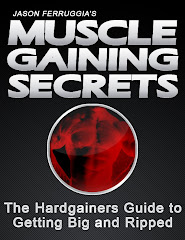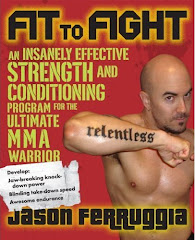Earlier in the summer, I had a chance to sit down and interview my long time friend and colleague, John Alvino. John has been in the trenches for over 15 years working with bodybuilders and athletes. Without fail, John produces some of the best results I have ever seen. The reason you have yet to hear his name is because unlike many armchair experts, John is actually still out there training clients for ten hours a day and doesn't have that much time. He's finally ready to be heard here for the first time. Read on for more...
Jason: John, could you give us a little background intro about yourself?
John: I started lifting weights in the eighth grade to get bigger and stronger for football. At that time, I was training in my basement with those classic Joe Weider, sand-filled weights. Even though football was my first passion, I began to love training just as much as I loved playing ball. However, since I had absolutely no knowledge, I got minimal results. I guess that 800-calorie junk food diet wasn't cutting it. This lack of results frustrated me so much that I became obsessed with learning how to get bigger and stronger. Fortunately for me, one of my close friend's older brothers was Mr. East Coast at the time. He noticed my desire and work ethic and invited me to come and train with him everyday. I guess he kind of took me under his wing. I'll never forget those days. He would pick me up after school and we would go to one of the hardest training gyms in New Jersey. He taught me a ton about bodybuilding. Under his guidance, I gained 11 pounds in no time flat. At that point, I was hooked. For the next 10 years, I turned myself into a human guinea pig. I experimented with every training and nutritional combination possible. Naturally, the more I learned experientially, the better my results were. My obsessive work ethic and research culminated in my winning first place in the Mr. Teen New Jersey State Bodybuilding Championship. I also placed in the top ten at the Nationals. Some competitors of mine were Jay Cutler, Craig Richardson, and Branch Warren, to name a few. Even when I was bodybuilding full-time, however, I never lost my athletes' mentality. For instance, I was never into that all show/no go style of training that so many body builders adhere to. It just never made sense to me. Thus, I have always developed training systems intended to improve aesthetics through hardcore strength training. As an example, just a couple of years ago my powerlifting buddies came to me and said, "We need one more guy to make a team at our meet." I said, "OK." I had absolutely no time to prepare for the meet, but I still took second place in my weight class at the Deadlift Nationals. In other words, I believe in having huge muscles that can actually DO something.
Jason: So how did you get into the business of training others?
John: When I was training hardcore, I never gave a second thought to training others. However, after I starting doing really well, competitors from all over wanted me to help them prepare for their shows. So I did. For the first five years of being in this business, I trained (almost exclusively) bodybuilders and people with aesthetic goals. One of the things I was known for was developing and individualizing nutritional systems that got guys body fat down to single digits in record time without losing muscle mass. I had great success, but I had everything down to such a science that I no longer felt challenged in my career. At that point, I turned my attention to my other passion: training guys for sports performance.
Jason: Why have you removed yourself from the inner circle of strength coaches and the internet in general for the past couple of years?
John: In order to answer that question, I have to give you a little history first. When I decided to train athletes for my career, I studied with all the top guys in the field. I traveled all over the U.S.A. and other countries as well. I read every book on the topic, attended every seminar, did internships, etc. I figured these guys must know more than I do. Look at the experience they have! Look at their success in their field! However, once I immersed myself in the world of "training gurus", something very strange happened. For the first time in my career, my results worsened! It didn't make sense. I figured that I was just applying my newfound knowledge incorrectly. It couldn't possibly be that I was getting faulty information, right? So I went back to these so-called mentors and experts to see what I was doing wrong. These pricks proceeded to convince me that if their teachings were not working, there must be a rare contagious blood disorder spreading through my gym, preventing positive training adaptations! God forbid their precious techniques are just a load of crap. No, they insisted; my clients clearly had an Ashwaghanda deficiency, and needed to start devouring a couple bottles per day immediately! These "gurus" had me stand on one leg, close my eyes, hold on to a bottle of zinc and perform strength tests to see what I was deficient in. It was ridiculous. They practically suggested witch doctors to perform exorcisms on my clients, who clearly were possessed by demons who were preventing them from making any strength or size gains! As my suspicion grew, I started researching all the so-called experts. And what did I find? I found that some of them never trained anyone. Not a single clientever! How could they possible prescribe techniques that they never tested? Were these training "theories" developed in a laboratory? I just didn't get it. I dug deeper. I found that some of these "gurus" could not bench 135 lbs or run a forty in 6 seconds. They were just sales people who can write well and know some impressive-sounding bullshit terminology. Do I sound angry? You bet I'm angry. I spent countless hours and countless dollars learning a lot of bullshit from a bunch of used car salesmen who call themselves experts.
Anyway, after my initial open-mindedness and trust turned to rage and disgust, I knew it would be best to remove myself from this inner circle of experts before I jammed a fat bar up one of their asses using one of their strength-zapping 6-0-4-0 tempo theories.
Jason: What would you recommend to my readers to help them avoid wasting time and money with these shysters?
John: Don't take my previous rampage in the wrong way; acquiring knowledge is absolutely imperative in this field. I could not have gotten to where I am today in complete isolation. For instance, I thank you, Jason, for teaching me some of your innovative views and theories. You have real knowledge that translates into real results, and that's what I always aim for in my own techniques. So I do value education. However, speaking from first hand experience, it?s very easy to get sucked in to some useless theory about training. Imagine reading in some big magazine that what you're missing in your training is pre-exhausting isometronic contractions at 32 degrees of elbow flexion. My clients gained 47.8% on their bench using this secret technique!? Sounds good, right? 47.8%...that sounds real nice. It sounds like a lot of chicks are going to be after your sexy ass once you buy this guy?s book, or pills, or DVD. However, unfortunately for you, my friend, it?s all BULLSHIT!! Don't fall prey to this nonsense. Education is important, but you have to learn from people who you actually trust! They may not be the best writers, or have a Ph.D. after their name. But they would never sell you a line of crap just to make a buck. They know their stuff, and they can help you get big and strong. Always be a pragmatist. Consider the source of your information. Are they nerdy little guys who never stepped foot into a gym? Or have they gotten into the trenches and used the very techniques they are prescribing to you? At this point in my life, I learn from a select few, and I learn mostly from experience and my own research. I promise that anything that I suggest to people is tried and tested by yours truly. I wouldn?t suggest something that I myself had not tried, and I would never want anyone go on the wild goose chase that I went through before I learned the truth. My techniques have been proven to work again and again, not only for me, but for my clients as well. If, in the process of suggesting a training technique or a diet philosophy, I happen to delve deeply into the science behind something, it's because I feel that it's important for people to truly understand what they are doing, rather than just listen to me because I'm John Alvino, the training guru. I know Jason feels the same and you guys are lucky to have found him.
Jason: Thanks John.
John: I'm just speaking the truth.
Jason: You have developed quite a reputation for getting guys big and strong. What are some of the unique things that you do to achieve such great results?
John: I had a strength athlete come in to see me recently. He was stuck and could no longer make muscular gains. After looking at his nutritional journal, I noticed he ate six pieces of fruit at one meal. In his journal, each piece of fruit was proudly labeled with its glycemic score. Apparently, he had read somewhere that you must eat low glycemic foods to keep your blood sugar stable, body fat low, insulin levels in check, blah, blah, blah.
Jason: Are you suggesting that people start eating higher glycemic carbs?
John: There is a lot of misunderstanding about glycemic index. Let's understand one thing: the glycemic index is a scale that ranks foods based on their rate of entree into the bloodstream, and thus, how they affect your insulin levels. The lower the glycemic index, the slower the rate of absorption, thus producing a very gradual rise in blood sugar and insulin. Low glycemic advocates recommend eating foods with a G.I. of fifty or less. One quick glance and it?s easy to see that there are not too many nutritious, calorie-dense, size-producing foods on that list! Now don't get me wrong, I'm not saying that people should eat jellybeans all day. I still advocate eating a diet consisting primarily of whole, natural foods. But one of the issues I have with revolving my clients life around the glycemic index scale is that all the foods are tested on an individual basis. In other words, the foods are ingested alone. This is another great example of some crazy lab coats that never saw a squat rack coming up with a totally illogical theory. First of all, every meal should have a protein base, a fibrous vegetable and some fat. This combination of foods, ingested at the same meal, will alter ALL of those foods? glycemic indices. In other words, the scale is inaccurate. For example, white potatoes (a staple in many of my size-seeking clients?food plans) are said to have a glycemic index of eighty-five. But this theoretical potato was eaten alone. In real life, the baked potato would be eaten with a protein source and a fibrous vegetable. Let's take a piece of salmon and a serving of broccoli as an example. Broccoli has a G.I. score of less than fifteen. This will slow down the digestion of the potato. Furthermore, salmon contains Omega-3 fatty acids, which also slow down carbohydrate absorption into the bloodstream. The point is, when these foods are eaten in combination, the high rate of absorption (glycemic index) of the potatoes is mitigated by the other foods that are eaten in the meal.
Jason: Very interesting. Do you still train bodybuilders?
John: Sometimes. At this stage, most of my clientele are athletes looking to increase speed. It's a perfect scenario for me, because it combines my passion for training with my passion for sports.
Jason: Is there any connection between training for bodybuilding and training for sport?
John: Obviously the training is very different. But some of the concepts and goals are similar. For instance, I am able to take my nutrition background and get my athletes very lean. The less excess body fat you carry, the faster you will be. There?s no way around this one.
Jason: That's a great point. Can you talk a little more about this?
John: Absolutely. Excess body fat hinders an athletes' ability to run at his/her maximum potential. Use common sense and picture running a forty while dragging an extra ten to fifteen pounds the whole time. It's not so efficient, now is it? Nutrition is the key to body composition. Athletes must learn how to eat properly in order to lose body fat while retaining (or even gaining) muscle mass.
Jason: You have a lot of success training athletes and increasing their speed. Care to share some of that info?
John: Well, a lot goes into what I do. But I can tell you one thing for certain. A lot of speed coaches focus primarily on only one component of training. I try to look at the whole picture and address everything from diet to technique. For example, recently, a local speed coach was getting some pretty minimal results with his clients. His dismal results drove a lot of his clients to seek me out. After evaluating their training diaries, I noticed that all this speed coach did was work on their running mechanics. Now I have no problem with working on running mechanics. But who cares how good their form is if they possess low levels of strength, or if their body fat is fifteen percent? Aren't we putting the cart before the horse here? You see, you need to have low body fat (ten percent or less), optimal flexibility, and incredible relative strength, or else the best running mechanics won?t help you. And that is where many speed coaches fall short, in my estimation.
Jason: Awesome stuff bro. Thanks for your time.
John: Anytime, Jay. I'm glad to be able to contribute to your website. You?re doing great things. Keep it up!
Check out http://johnalvino.com/ for more info.
Muscle Gaining Secrets

"Discover How to Gain 27 Pounds of Rock-Hard Muscle in 12 Weeks... Without Long Workouts, Dangerous Steroids or High Priced Supplements." Visit www.MuscleGainingSecrets.com for more info.
Fit to Fight

"Discover The Little Known, Rarely Used Training Secrets Of An Elite Combat Conditioning Coach." Order your copy at www.Relentless-Athletics.com.
About Me

- Jason Ferruggia
- A world renowned fitness and performance enhancement specialist, Jason has helped thousands of athletes, hardgainers and weekend warriors achieve their goals in record time. He is the head training adviser for Men's Fitness magazine as well as a regular contributor to several other magazines including Men's Health, Maximum Fitness, Muscle & Fitness Hers, Shape, Today's Man & MMA SportsMag.
Support Cancer Research

Please Visit www.LiftStrong.com
Stop The Genocide in Darfur

Go to www.SaveDarfur.org to learn how you can help.
Make A Difference

Visit www.Habitat.org to find out how you can get involved in a great cause.
Links
Subscribe To This Blog
Blog Archive
-
▼
2006
(17)
-
▼
November
(9)
- Are You Too Busy To Workout?
- How to Get Jacked
- Performing Like Georges St. Pierre
- Becoming a Bad Ass Martial Artist
- The Ultimate Energy Bar
- Full Body Workouts Vs. Bodybuilding Splits
- Atlas Shrugged (But "How" Is The Question)
- The Fastest Growing Sport in the Country
- The Best Fitness Expert You Never Heard Of
-
▼
November
(9)
Quote of the Week
"A man can be as great as he wants to be. If you believe in yourself and have the courage, the determination, the dedication, the competitive drive and if you are willing to sacrifice the little things in life and pay the price for the things that are worthwhile, it can be done."
Vince Lombardi
Vince Lombardi

